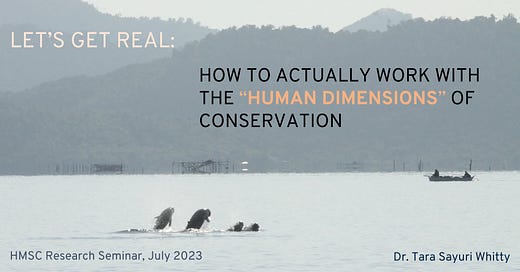Presentation on the "Human Dimensions" of Conservation
Invited talk for the HMSC Summer Seminar Series
I recently used this phrase in an email to a collaborator: “Time management has once again fallen out of alignment with reality.” And so, I continue to lag with posting new episodes - not that these are hugely time-sensitive - though the end is in sight, and I have six more interview episodes that I will be getting to you in the next 2 months.
An unexpected, though very welcomed, invitation to present at the Hatfield Marine Science Center’s (HMSC) Summer Seminar Series last month also displaced some of my “edit, prepare transcripts, record intro, edit, upload and post” time, but it was very much worth it. My former PhD advisor, Dr. Lisa Ballance, is now director of the Marine Mammal Institute at HMSC and we have some schemes regarding a course in transdisciplinarity for conservation up there. In the meantime, this invitation to give a seminar was a fun opportunity to develop a new talk and explore how I’d like to present ideas that I haven’t really had the chance to share in platforms other than this podcast. Unfortunately, it was a Zoom presentation, though I hope to make it up there in person one day!
Though academia is certainly not a good match for me, I do appreciate the intellectual realm of conservation (or any field) - the space to observe the accretion and evolution of one’s ideas, and to frame it in a cohesive package to share with others, is immensely enjoyable to me. If you’d like to hear my thoughts on why the phrase “human dimensions of conservation” is actually pretty misleading, please check out HMSC’s recording here!
ABSTRACT: Work concerning the "human dimension" of conservation is still too often relegated to the shadowy margins of major conservation platforms, and measures to promote inclusion and protect the rights of communities in conservation projects are often seen as an afterthought, if not an inconvenience. Even the popular notion of conservation having a "human dimension" is misleading because in reality, human values and social processes define conservation - they are not merely a "dimension" of it. Based on experiences studying marine megafauna bycatch in small-scale fisheries and working with coastal communities on fisheries management, this talk demonstrates the realities of what happens when the humanity in conservation is not meaningfully incorporated into conservation efforts and shares promising pathways for more practical and ethical co-design of conservation with communities.
[EPISODES TO RESUME THIS COMING WEEK]





*Love* this seminar. It was so very inspiring to so many up here. Changed at least a few lives - truly.